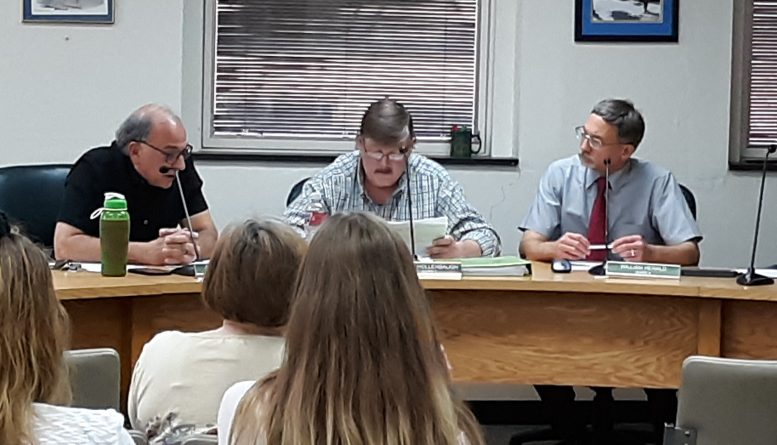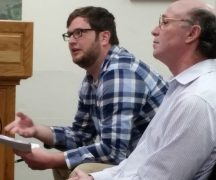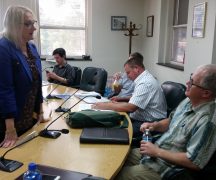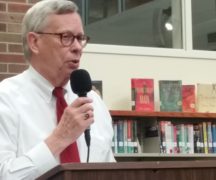By JAN LARSON McLAUGHLIN
BG Independent News
Bowling Green took the next step Monday evening to banning single-use plastic bags at local retailers.
The question remains, however, if the ordinance will be adopted by City Council or if it will go on the ballot in November for citizens to decide.
The three council members on the committee creating the ordinance – Mark Hollenbaugh, Bill Herald and John Zanfardino – came to a consensus on all other portions of the plastic bag ban except how it will be enacted – by council or by election.
The committee, led by Hollenbaugh, has listened to public comments on the proposed legislation for about six months.
“Now it’s time for us to do something,” Hollenbaugh said. “People keep saying we are dragging our feet.”
The draft legislation will prohibit businesses and other organizations from providing single-use, carryout, thin plastic bags within Bowling Green.
The proposed definitions in the ordinance include:
- “Thin plastic bag” as a bag predominantly made of plastic which has a thickness of 2.25 mils or less.
- “Single-use bag” as a bag which is not reusable.
- “Carryout bag” as a bag provided by an establishment to a customer at the cash register to carry obtained items out of the business. A carryout bag does not include a bag brought by the customer; a newspaper bag; a bag provided by a pharmacist for prescription drugs; a bag used to package a bulk item or to wrap a perishable item; a bag intended for use as a dry cleaning, garbage, pet waste or yard waste; or a bag provided at curbside pickup.
Businesses may ask to be exempted from the ordinance by applying for a temporary variance due to economic hardship. The appeal would cost $75, and must be renewed annually by the city’s proposed Sustainability Board.
Penalties for not complying will start with a warning for the first violation. The second violation in a 12-month period will be $100, followed by $200 for the third violation, and $300 for the fourth violation.
The council committee members initially disagreed about when the plastic bag ban should go into effect, with Zanfardino favoring the earliest implementation of one year after the legislation is passed. Herald suggested Jan. 1, 2021, and Hollenbaugh recommended it be delayed until Jan. 1, 2022.
“All the research has suggested the success or failure of such an ordinance” rests with the public’s willingness to support it, Hollenbaugh said. So a slower implementation would allow the community to be educated and businesses to work through their existing supplies of plastic bags.
The committee agreed on the middle date of Jan. 1, 2021.
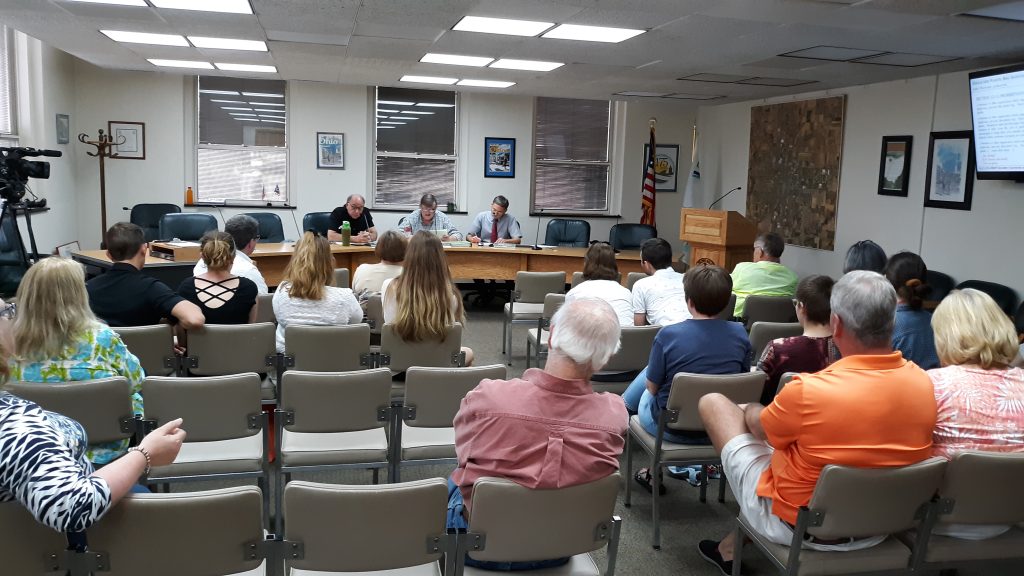
The ordinance also addresses the creation of a city Sustainability Board, which will handle the appeals made by businesses, provide direction on environmental and recycling policies, and conduct periodic reviews of such policies.
The Sustainability Board will be made up of seven members appointed by the mayor to four-year terms. At least one member must be a BGSU student, and at least one must be a business person.
The board will be encouraged to meet on a monthly basis, and the city’s sustainability coordinator will be asked to make monthly reports to City Council.
Initially, Zanfardino was concerned that including the formation of a sustainability board in the plastic bag ban legislation would make the ordinance too cumbersome.
However, he said Monday he reconsidered that concern.
“I certainly think it will be great for Bowling Green to have a sustainability board,” Zanfardino said.
Hollenbaugh agreed.
“I think a sustainability board is essential to make the ordinance work,” with the board handling appeals, and studying the successes and failures, he said.
The board will also ensure that the city’s sustainability efforts will continue, Herald said.
“We don’t want this to be a one-and-done issue,” he said.
During the City Council meeting following the plastic bag meeting, Council President Mike Aspacher complimented the committee members for their work on the issue.
“I felt the process was very thorough,” he said.
The draft proposal will be cleaned up and sent to City Attorney Mike Marsh for review, before it is presented to the entire City Council.
The one issue remaining unanswered is where the ordinance goes from there – will City Council act on it, or will it pass the decision on to the voters?
Herald pushed for the ordinance to be voted on by citizens at the November election. He suggested by taking it to a public vote, it would increase the sense of community of “we’re all in this together.” The issue could also help the school issue on the ballot, he said.
Herald also said he hoped this issue would be Bowling Green’s “firewall” against the prevalent divisiveness found now in national and state government.
Zanfardino repeated his belief that council should make the decision. “I feel this is our responsibility,” he said. “We’ve talked about this extensively for six months.”
Zanfardino added that he didn’t believe the ordinance would have any bearing on the school issue on the ballot.
Hollenbaugh talked about the philosophy that voters elect council members to make decisions on their behalf. However, since Hollenbaugh was appointed to his council seat and is up for election this year, he suggested that council as a whole determine how the plastic bag ban ordinance is decided.

